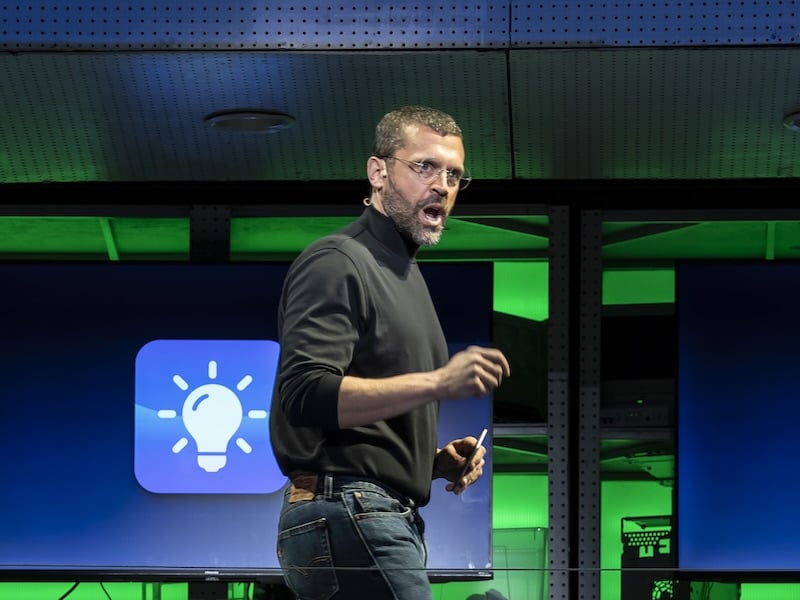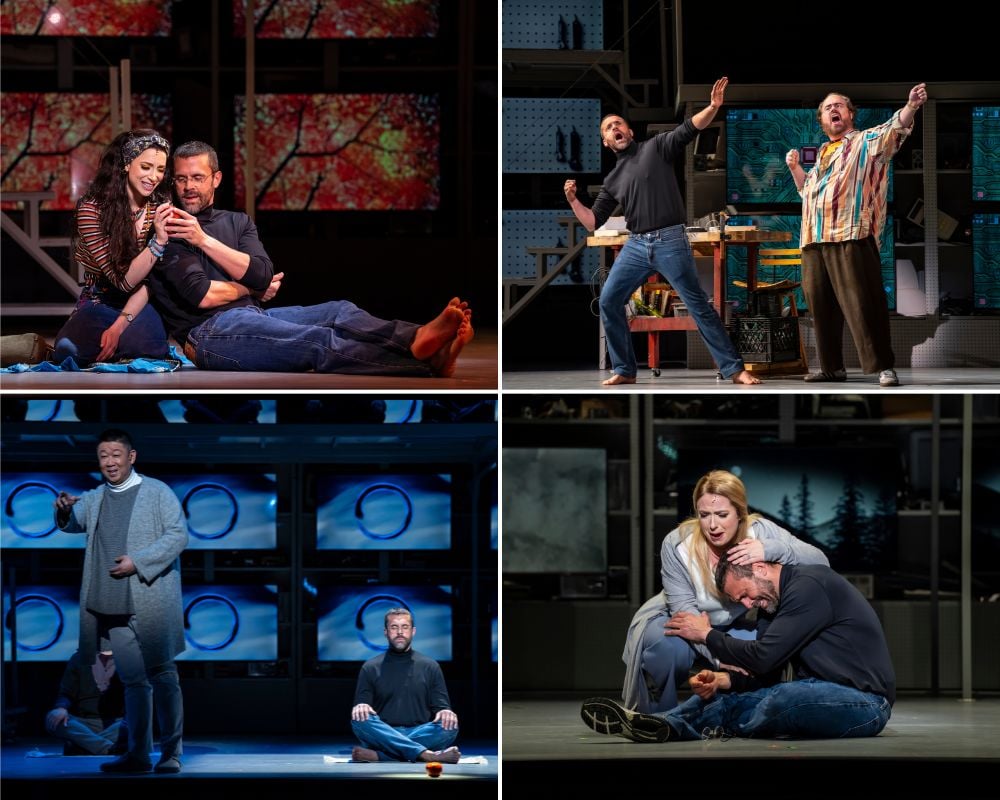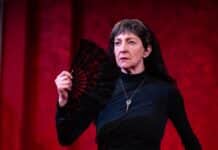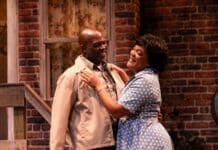Twenty-five years into this century, the opera world is still (albeit sometimes tentatively) exploring what exactly are the stories and musical languages to speak eloquently and with passion to our times. Nowhere in America is this gambit felt more than with WNO and Artistic Director Francesca Zambello, where next to classics passed down from the likes of Verdi, Puccini, Wagner, and the upcoming American chestnut from the Gershwin Brothers, Porgy and Bess, the company develops and presents new American talent and perspectives, including performers and creative team collaborations. In 2023, WNO presented the premiere of Grounded, an opera that explored the moral and psychological implications of drone warfare. This month, they bring to Washington audiences The (R)evolution of Steve Jobs, in a music-theater portrait of a complicated man very much at the center of a technology that revolutionized our world, but whose evolution as a man connecting to himself and fellow humans was an even more arduous journey and ultimately moving breakthrough.
Mark Campbell, one of America’s most successful contemporary librettists, collaborated with composer Mason Bates, who won a Grammy Award for the recording of this opera when it premiered in Santa Fe in 2017. They have created an important and, I believe, lasting opera in the repertoire. There are two productions of this opera thus far, co-owned and produced in rotation among a handful of regional companies.

At first, it seemed an unlikely subject for Campbell to tackle — he doesn’t seem a “techy geek” kind of guy. But he has found his way into the psychological heart of a man tormented in many ways by his own genius and cruel to his collaborators, employees, and girlfriends alike, but who, in struggling with a diagnosis of terminal cancer, finally comes to terms with his own mortality and admits his need for human connection. Campbell brilliantly eschewed a straightforward chronological storytelling and instead has created both a structure and embedded philosophy of circularity.
This circularity resonates with our understanding of the human side of the often barefoot, vegan Jobs, who was obsessed with Buddhism. In fact, his sensei, the character Kōbun Chino Otogawa, is one of two heroes in the opera. Sung masterfully by bass Wei Wu, Kōbun is a cross between a spiritual guide from on high (and sometimes from beyond the grave) and a perched-on-his-shoulder Jiminy Cricket conscience who can kick Jobs in the ass from time to time or joke, “Yeah, karma sucks.”
The opera opens with the vast stage filled floor to ceiling with a bank of file drawers representing the old world before the tech revolution. With the push of a button, the projected images soon change to banks of screen monitors flanking the stage. Other than this, the stage is unadorned but for a few straight benches where ensemble members give witness and can step into a scene as needed. Stage Director Tomer Zvulun has created elegance in simplicity itself with a very lean chorus by opera standards but very able-bodied physical as well as vocal presence of its members.
From the very start, we get stage pictures filled with life. There, downstage center, sits the cross-legged and barefoot Jobs in meditation. Simultaneously, a scene comes to life on a small high platform of Steve as a young boy (Stone Stensrud) when his father (Justin Burgess) presents the ten-year-old with a worktable he has made for him on his birthday to spur on his mechanical aptitude.
The classically trained composer Bates clearly signals his interest in popular music and specifically his experience as a dance music DJ. In the first ensemble number, the pulsing electronic beat all but transports to a club, while the words “One device has it all” convince us of the inevitability of the Apple Revolution to change the world. And so, with electronic sound used in conjunction with the full orchestra led by conductor Lidiya Yankovskaya, the opera is unapologetic about these opera singers being mic’d. Get over it, Opera Aficionados!

Let’s be clear, Jobs and his buddy and early partner Steve Wozniak (“Woz”) were indeed radical bad boys who wanted to “stick it to the man.” In an early scene, John Moore as Jobs and Jonathan Burton as “the Woz” figure out how to mimic Ma Bell tones and famously ring up the Vatican impersonating Henry Kissinger. The duets by these two singers are some of the most fun and compelling compositions, and the singers displayed great stage chemistry. But the “bromance” doesn’t end well when these two latter-day Davids later spar over who’s brought down Goliath, and the egotistical Jobs, grabbing all the power, pushes Woz to quit the company.
Campbell doesn’t sugarcoat it, and neither does Baritone Moore: Steve Jobs was not a nice guy. His relationship with lover Chrisann gets particularly ugly when he abandons the pregnant woman and denies paternity responsibility for their child. Two very vocal female members of the audience shouted their extreme displeasure across the auditorium at Steve Jobs’ reaction. Coloratura Kresley Figueroa as Chrisann, with her ultra-fast vibrato, gets short shrift by the creators.
Moore gives an exciting, emotional performance throughout without ever overblowing notes and turning into a walrus baritone. His approach is to offer a clean, contemporary sound, one I think Steve Jobs with his emphasis on elegant perfection and simplicity would approve.
But in addition to Kōbun, the other real hero in the piece is Jobs’ partner and later wife, Laurene, who stays by him through it all. Mezzo-soprano Winona Martin brings warmth and intelligence to the role, and Bates gives her beautiful melodic lines to accent her strength and genuine love and compassion for this man.
The production is jointly owned by the Atlanta Opera, Austin Opera, Lyric Opera of Kansas City, Utah Symphony & Opera, and Calgary Opera Association. In these precarious times, look for more of these alliances if opera is to stay alive. And contemporary opera, like all arts, must be free to respond to their times.
The creators have successfully compressed the action to what is acceptable to 21st-century audiences. The opera runs one hour and 40 minutes with no intermission.
P.S. I will admit mixed feelings attending the Kennedy Center as it has been seized as prize and become a political hot potato. I understand how many of my friends have decided not to attend events there under its current cloud. But I will ask people to consider also the many artists and crew members who bravely put on good work like the Steve Jobs opera. They depend upon audience members to support them in the exercise of their craft.
Addendum
The opera’s conductor weighs in on supporting the Kennedy Center, and ‘stars of tomorrow’ shine in the cast.
By John Stoltenberg (May 11, 2025)
No sooner had my colleague Susan Galbraith added to her glowing review of The (R)evolution of Steve Jobs a last paragraph urging people not to boycott the Kennedy Center than the opera’s conductor, Lidiya Yankovskaya, published a full-throated op-ed in the Washington Post explaining, despite her “displeasure with the White House’s approach to the arts,” “Why I’ll still perform at Trump’s Kennedy Center.” It’s a serious and thoughtful argument:
Choosing not to perform deprives artists and art of power, and it aids regimes that fear being culturally challenged. Choosing not to attend performances of content we support will only ensure that this content is not presented in the future….
If we want to fight censorship and ensure a diverse range of programming options, we must continue to support the art that we want to see on the Kennedy Center stage for as long as we can.
On Friday evening, May 9, the Kennedy Center Opera House was the scene of two remarkable events. One was the full-on Secret Service security in the lobby — magnetometers, bag searches — occasioned by the presence of someone (or someones) whose identity was never publicly revealed. (I asked a few officers; none would divulge.)
But the more important remarkable event — the one I’d come for — was the presence that night of Cafritz Young Artists of Washington National Opera in the (R)evolution of Steve Jobs cast. In Artistic Director Francesca Zambello’s pre-show welcome, she called them “stars of tomorrow.”
The sound reason for that praise soon became clear. In performance, each of these young artists met every vocal challenge, commanded our attention, portrayed their character with credibility, and propelled the story convincingly.
Here they are, each one a standout:
Steve Jobs: Jonathan Patton (baritone)
Laurene Powell Jobs: Winona Martin (mezzo-soprano)
Steve (“Woz”) Wozniak: Nicholas Huff (tenor)
Chrisann Brennan: Anneliese Klenetsky (soprano)
Caligraphy teacher: MichelleMariposa (mezzo-soprano)
Plus two Cafritz Young Artists program alumni:
Kōbun Chino Otogawa: Wei Wu (bass)
Paul Jobs: Justin Burgess (baritone)
Though vocally each of these singers was in superb professional form, I did observe on this night what felt like learning-still-in-progress: Some of the performers’ movement onstage seemed tentative and uncertain — as if their role and blocking had not yet become solidly embodied with the confidence and muscle memory that can come with a longer run. This minor need for improvement was, in a way, another major argument for Kennedy Center support: It’s not only a place that shows great art; it’s a place that grows great future artists.
The (R)evolution of Steve Jobs played May 2 through 10, 2025, presented by Washington National Opera performing in The Opera House at the John F. Kennedy Center, 2700 F St. NW, Washington, DC. For the schedule and to purchase tickets ($45–$269), go online or contact the Box Office at (202) 467-4600.
In English with Projected English Titles
The program for The (R)evolution of Steve Jobs is online here.
Composer: Mason Bates
Librettist: Mark Campbell
Conductor: Lidiya Yankovskaya
Stage Director: Tomer Zvulun
Steve Jobs: John Moore
Laurene Powell Jobs: Winona Martin
Kōbun Chino Otogawa: Wei Wu
Steve (“Woz”) Wozniak: Jonathan Burton
Chrisann Brennan: Kresley Figueroa
Paul Jobs: Justin Burgess
Young Steve: Stone Stensrud
COVID Safety: Masks are optional in all Kennedy Center spaces for visitors and staff. If you prefer to wear a mask, you are welcome to do so.




